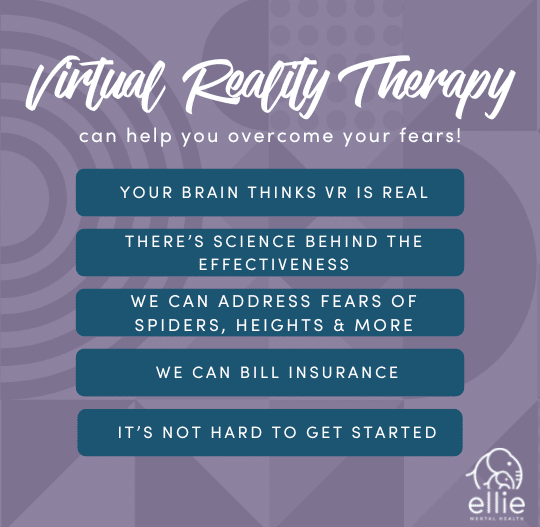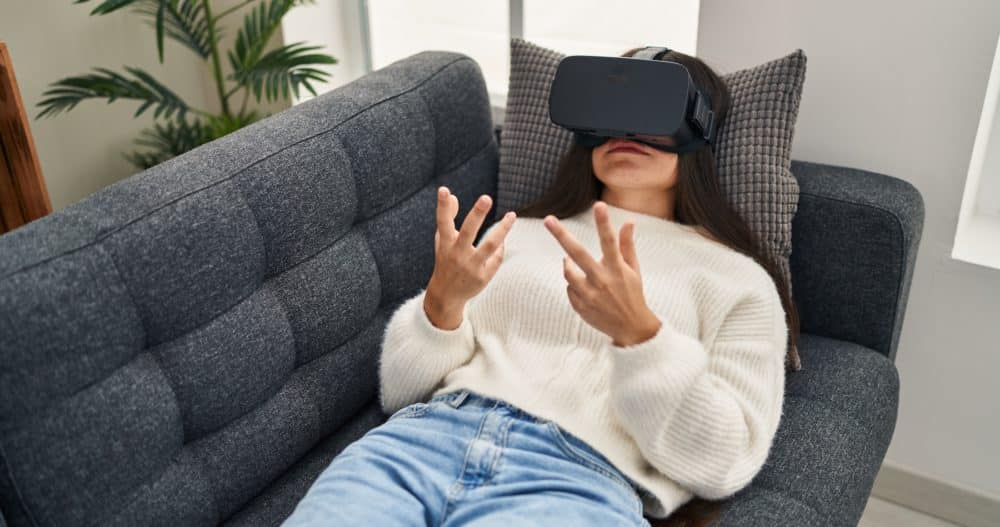Have you ever turned down a vacation because you don’t like flying? Denied a road trip because driving is scary? Heck, maybe you despise going into your basement due to those pesky, freaky spiders! Perhaps you’re like me and threw a book through a bedroom door because a centipede was walking across it (true story, I had to buy a new door and everything)! Fear has a nasty habit of running our lives, but virtual reality therapy is flipping that script.
To make things even more tricky, overcoming fears is hard because to overcome them, you have to face them head on and, often, alone. It’s not like you can take your therapist on a plane, right? Well, that used to be true but now… cue the baller music… Virtual Reality enters the chat!
Virtual Reality (VR) has been around for a hot minute at this point, but only in recent years has it been a truly viable piece of technology. When most people think of VR, they often think of video games or cheesy experiences that you can have at the Mall of America but at Ellie Mental Health, we have a different perspective. We are using virtual reality therapy as a professional therapeutic tool to help people take back control of otherwise fearful experiences.
8 Reasons Why You Should Consider Virtual Reality Therapy for Overcoming Your Fears
Technology is always advancing and we as helpers have an opportunity to use technology to better connect with and help others. So, yes, historically VR has been seen as a video game or a nerdy thing, but it’s also a tool that we can use to make some serious, lasting changes.
Here are 8 things you didn’t know about Virtual Reality Therapy (VRT):
1. VR Is Not Just a Toy
While it’s true that virtual reality can taking your gaming experience to the next level, VR provides so much more potential for real-world applications. It’s a highly immersive tool that allows us to recreate specific, highly detailed experiences. Physical therapists, memory care facilities, even firefighters and other first responders have been using VR in a wide variety of ways, ranging from different therapies to training simulations.
2. Your Brain Thinks VR Is Real
You know its fake but that doesn’t matter; your brain thinks it’s real! Yup, you read that right. While our brains are massively complex organs, they’re also incredibly simple and easy to trick. So the high fidelity of modern VR equipment makes the experiences seem even more real and therefore all the more believable to your brain, which is why virtual reality therapy is such a valuable tool for exposing your brain to the things that trigger a fear response.
Want to see for yourself? Look up some videos of people trying Richie’s Plank Experience for the first time (and no, we’re not going to start off standing on a plank on top of a skyscraper… though that was my first experience in VR).
3. We Work Together to Set a Pace and Ease in
We don’t just immerse you in spiders or [insert your worst fear] right away – that would be too much!The process is based on Systematic Desensitization and evidence-based Exposure Response Prevention methods. This includes creating what we call a SUDS (Subjective Units of Discomfort Scale) Ladder. Meaning, we determine a series of steps that are increasingly more distressing and work our way through it.
In the spider example, it’s not straight to Aragog in the Forbidden Forest (that’s a Harry Potter reference, for those who missed it), but rather the first step might be starting with one small spider under a glass jar on the countertop.
Since we go at your pace, that also means we do our absolute best to keep you from getting motion sickness. The very first time I tried VR I got super-duper nauseous and had to stop before I even got started, but that was almost 8 years ago and the technology has come a long, long way since then. Things like higher frame rates, wider field of view, higher resolution and better tracking have all improved the VR experience. Today I can be immersed in VR for a few hours with no problem. Beyond this, just like we can trick your brain into thinking VR is real, we can train your brain to be desensitized to VR sickness.
4. There’s Science Behind the Effectiveness
These are peer-reviewed, effective, and as I mentioned before, evidence-based therapies for reducing or eliminating fear responses. Systematic Desensitization was one of the first therapies for extinguishing fear responses and really paved the way for other current therapies such as EMDR, Brainspotting, and more. In creating the VRT program at Ellie, we pulled over 30 peer-reviewed research papers from the last 5 years. TLDR;this $h!t works and we can prove it.
5. Virtual Reality Therapy Isn’t Just for Teenagers
It’s never too late to face your fears! We work with people of all ages, with just one exception.Remember when I said that sometimes technology advances faster than we can understand it? This is the case when it comes to developing brains and we don’t quite understand how VR might affect children and pre-teens, so presently, these services are available to anyone age 14 and above.
6. It Goes Beyond Spiders and Heights
We have over 150 modules and we can get super creative! Some other examples are: flying, driving, snakes, social settings, public speaking, blood draws, dentists, water, vomit… you get the picture.
7. We Can Bill Insurance for Virtual Reality Therapy
Worried that virtual reality therapy isn’t covered by insurance? The good news is that we can and do often. And it won’t conflict with existing your individual, relational, or family therapy services. We are also able to do private pay, for those who don’t have or don’t want to utilize their insurance.
8. It’s Not Hard To Get Started
The process is a easy as clicking the link below, filling out a form, and waiting for our awesome Client Access Team (otherwise known as CATs… meow!) to reach out.
Intrigued? Virtual reality therapy is seriously amazing! Learn more about VRT with Ellie Mental Health.



